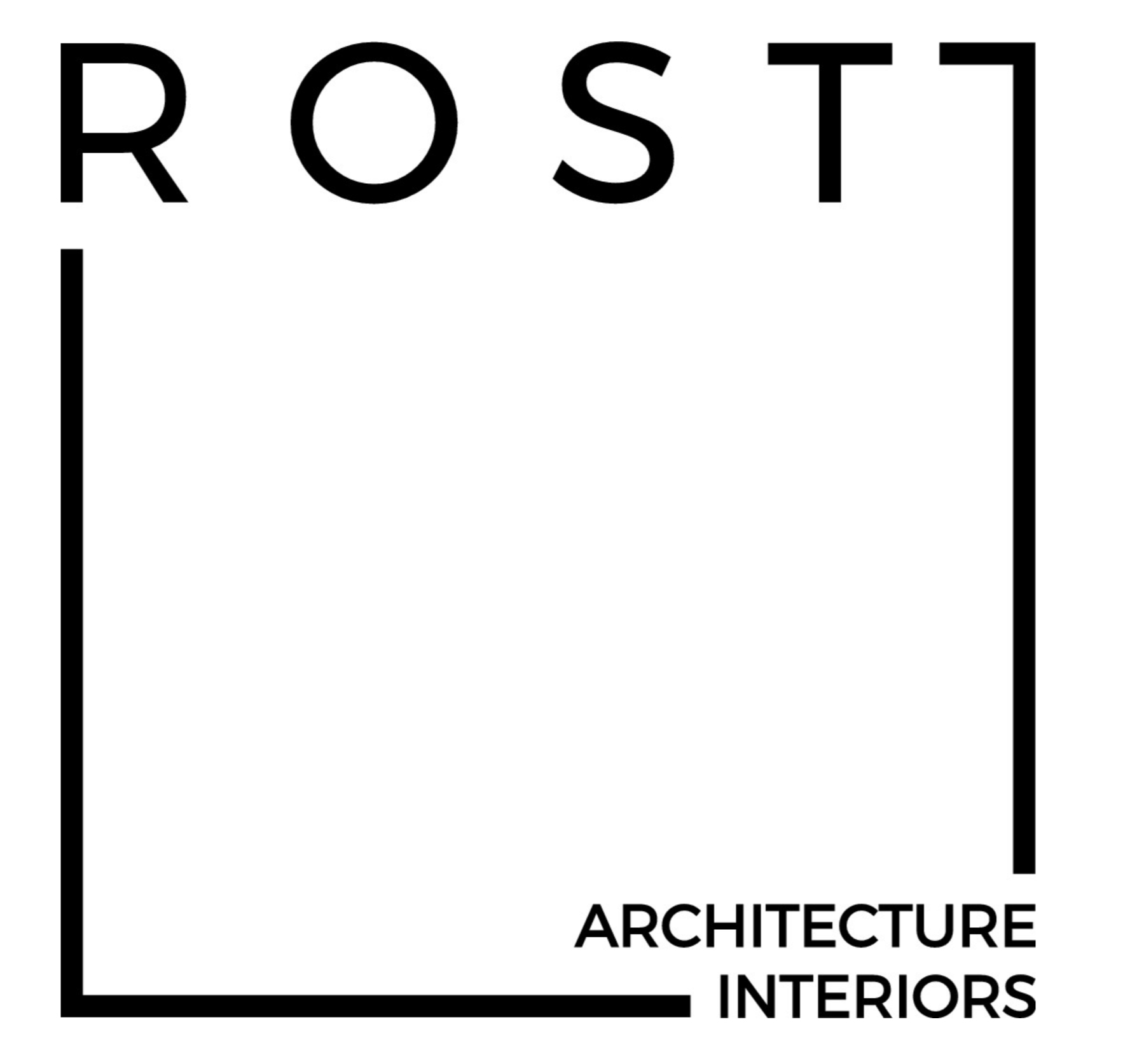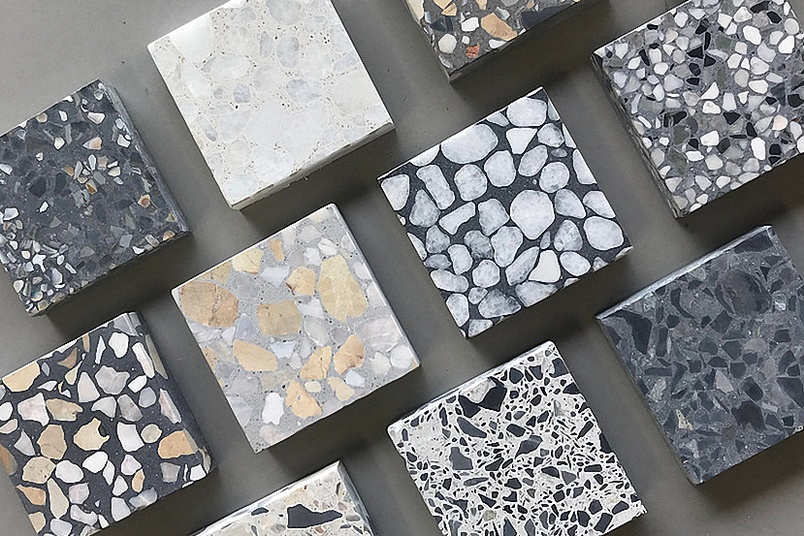Selecting The Right Kitchen Counter Top Material
In our custom homes, the kitchen counter material is often one of the first selections made in the finish pallet. Kitchen surfaces are usually focal points in our designs and set the tones, textures and feeling for the rest of the materials in the space.
Guests sit at the kitchen island at dinner parties, kids do their homework at them and meals are prepared there every night. The surfaces are used and engaged with daily, therefore it is critical to get the material selection right in terms of aesthetics and functionality. Below are some of the most common materials we use for kitchen counter tops and the pros/cons of each material.
A typical assortment of counter top materials that we present to our clients. Limestone, Quartzite, Marble, Porcelain, and Corian.
Engineered Stone/Quartz
The cost for quarts can be between $50 and $100 square foot for material only. This does not include installation. It is a man made, engineered stone, not to be mistaken with quartzite which is a natural stone. Caesarstone and Silestone are two of the most popular brands/companies that manufacture and produce quartz surfaces.
Quarts usually made of 93% crushed natural stone mixed with 7% resin. This makes it more durable than natural stone. It is non-porous, does not require sealing, and is very resistant to staining. Also, because quartz is made with crushed stone, it does not require the carbon intensive process of mining slabs and transporting overseas.
Recently quartz has become extremely popular. We’ve seen an increase in the use of this material due to the high durability, low maintenance and ability mimic natural stones.
We’ve used quartz on several projects and are very happy with it’s performance both functionally and aesthetically. More and more quartz products are becoming available, some that mimic natural stones so closely that it is difficult to differentiate them at first glance.
Quartz from MSI
Natural Stones
Quartzite
A low cost quartzite can cost around $60 per square foot while a higher end quartzite can cost around $120 per square foot. Quartzite is a naturally occurring metamorphic rock that is harder than granite. Quartzite withstands heat very well however discoloration can occur if exposed to extreme heat. Like all natural stones, quartzite should be sealed. We recommend sealing about twice a year.
Quartzite can come in a variety of finishes from a high polish to a leather honed texture. Recently we saw a beautiful slab of quartzite in a leather finish (sample pictured below) at a slab yard in Orange County. The product was called Naica by Marbolis.
Natural Quartzite
Granite
Granite can usually be purchased for around $40 - $60 SQFT. It is a natural stone and is heat resistant and stain resistant when sealed properly. In the late 1990’s/early 2000’s every home builder and re-modeler was installing granite counter tops. Many homeowners are fatigued by the use and appearance of the material now. For this reason we typically shy away from using granite counter tops in our designs. There are some rare instances where we find an exceptionally beautiful and unique slab of granite and will present it as an option to a client.
Granite Slab from Slab Yard
Marble
The cost of Marble typically starts art round $125 a sqft and can go up to $250 sqft.
Marble is an igneous rock. It is softer and more porous than quartzite and granite. It is usually seen as a high maintenance surface because of the continual sealing and refinishing that needs to be performed on it. Marble should be sealed about once every six months.
Because your food will be in contact with the countertop, be sure to use a non-toxic sealer. This holds true will all stone sealers.
Two of the most common types are Carrara and Calacatta. Carrara marble is a greyish beautiful marble usually with beautiful veining.
We usually guide our clients away from using natural marble on their counter top surfaces due to the high maintenance and the high probability of scratching and chipping. However, using marble in other locations that are not exposed to everyday wear and tear, such as feature walls or accent inlays, is always an option.
Natural Marble Sample
Soapstone
Soapstone usually costs around $70 per square foot on the lower end and $120 per square foot on the higher end. This makes it more expensive than granite and quartz. Soapstone is a natural metamorphic rock that is sourced from a quarry. It feels soft and soapy to the touch due to the high talc content in the stone. The colors of soapstone usually range from light grays to deep charcoal tones. Soapstone has a tendency to darken overtime. A slab of darker charcoal soapstone could end up almost black over time.
Soapstone is very dense and non porous therefor it typically does not stain and is very resistant to heat. Because of its ability to withstand high heat, we’ve seen soapstone be used around fireplaces.
However, it does have a tendency to chip and scratch under heavy use. Some installers recommend sealing soapstone while others say it is not necessary. We’ve also been recommended to apply a mineral oil on soapstone surfaces every month or so.
Overall, if you want to go with a natural stone and a organic feel in your kitchen, we would absolutely recommend soapstone. We love the character and patina that develops in a light grey slab of soapstone over time and the soft/soapy texture of the surface.
Soap Stone Slab from Walker Zanger
Limestone/ Travertine
We love the appearance, texture and feel of limestone. It is a luxurious and timeless material, however, we usually do not recommend using limestone as a counter top surface. Limestone is extremely soft and it absorbs moisture and stains quickly if not regularly sealed. We put this material in the list because we have many owners that want to use limestone as their counter top material because of the phenomenal aesthetic appearance of some limestone slabs. Although they can look great, their performance as a kitchen surface is underwhelming compared to some others listed in this article.
That being said, we are a huge advocate of limestone/travertine slabs being used in other locations with less wear and tear. Accent walls, inlays, and behind bars are all great locations for this material.
Natural Limestone Sample Polished and Sealed
Concrete
Concrete counter tops may seem inexpensive, however installation prices can drive the overall cost of a concrete counter top much higher than initially anticipated. Concrete counter tops can be either precast off site or poured in place. It can be cast and finished in an endless variety of tones, textures and shapes. A concrete counter top should be resealed about every two years. If a counter top is poured onsite, the surface can have minimal if any seams. However, if not done properly, cracking can occur. A concrete counter top will be relatively resistant to high heat and does not absorb stains easily.
In the past, we’ve worked with a company called Concrete Collaborative who produces some amazing concrete tiles, slabs and pavers. We used one of their terrazzo slabs in a recent project with mid century modern influence.
Concrete Collaborative Terrazzo Samples
Butcher Block
Butcher block can run anywhere from $75 – 150 per square foot.
It is basically strips of wood adhered together to form a solid slab of wood. Butcher block counter tops can age beautifully and provide a kitchen with a warm vintage feel. They can come in several grain types including end grain, face grain and edge grain. Maple is one of the most common woods used because of its hardness and clear grain.
We typically recommend that butcher block counters not to be sealed because of the high toxicity of most sealers. We do not want our clients food touching these chemicals. Finishing your butcher block counters with a natural oil every six months will help keep the surface protected. For the areas of your butcher block counter that endure heavy use, sanding with a fine grid sandpaper and re-oiling can help remove surface damage.
Just be aware that it is virtually impossible to keep a butcher block counter in “perfect” condition free from scratches, stains and discoloration. The point of this type of surface is to find beauty in these imperfections and embrace the aging process of the material.
For some, the wear and tear on a butcher block counter improves it appeal and gives a kitchen a vintage character. For others, the imperfections are unwelcome. If you are looking for a warm natural feel in your kitchen, we would absolutely recommend butcher block. We love the character and worn feel that a large butcher block surface can add to a kitchen.
Butcher Block Countertop
Corian
Corian typically costs around $50 per square foot on the lower end and can range all the way up to $150. An average price for a Corian counter top would be between $42 and $65 per square foot.
Corian is a product produced by Dupont known as a solid surface material. It is made primarily of a polymer or plastic and is non-porous. One of the main benefits of Corian is the large selection of colors and styles it comes in. When using the product, we will usually stick to solid colors such as whites and grays. We love the fact that the seams between Corian pieces can be polished to create the look of a large single surface.
Typically, Corian is seen as a more attractive option than laminates or tile but inferior to natural stone or most of the other engineered stone products. It is a great selection for commercial office spaces where you need a durable product, that can also look moderately high end for a reasonable price per square foot.
We would typically not recommend a Corian surface over a natural stone or quartz product in our custom homes. However, we have seen some interesting applications of Corian recently with CNC milled 3D patterns in the surface. We are installing one of these surfaces in a custom home currently.
Porcelain
Porcelain is a clay product fired at high temperatures and glazed to add color and surface patterns. Porcelain counter tops have been used in Europe for quite some time now. With some porcelain products on the market, it is obvious that the texture on the surface is not natural, however with others it is very difficult to tell. Some can look like a low pixel graphic screen print while others can look like flawless slab of natural Calcutta marble. Sealing is not required with Porcelain. It usually comes in matt honed or polished finishes. It is heat resistant and the color typically will not fade or deteriorate over time. On of our favorite qualities of porcelain is the large format slabs that it comes in. This means minimal seams and grout lines. Below is an example of a few porcelain slabs we saw recently, from this distance, the product was virtually indistinguishable from a slab of natural marble.
Porcelain Slabs at Slab Yard
Selecting Your Counter Top Material
Knowing your options when selecting a kitchen counter top material is critical. We’ve found that the best way to select counter top materials is to show clients small samples of our recommended material selection and discuss the pros and cons of each material. After we dial in the selection, we organize a trip to the slab yard to select the exact slab that will be used in the home/space. Going to the slab yard is essential because a large slab can look significantly different than a small sample. This is especially true when using natural stone as no slab will be the same.
If you need assistance selecting the best material for your project, feel free to reach out to our interior design department here.
Quartz Slab at Slab Yard









































